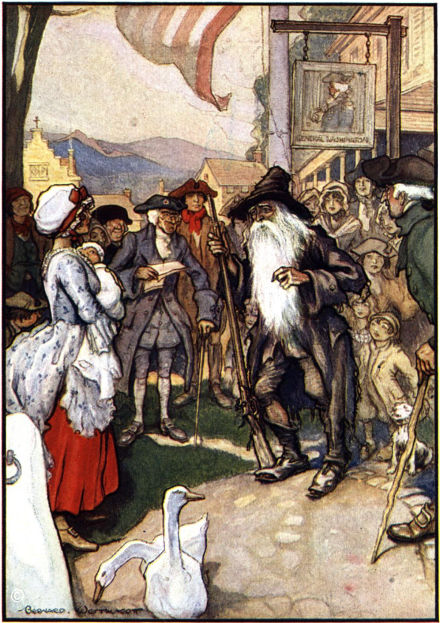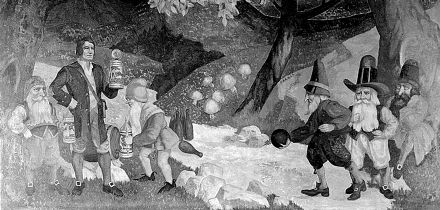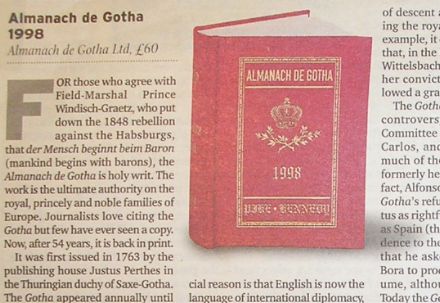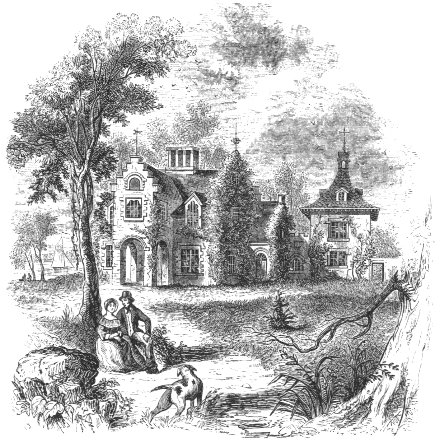Books
About Andrew Cusack
 Writer, web designer, etc.; born in New York; educated in Argentina, Scotland, and South Africa; now based in London.
Writer, web designer, etc.; born in New York; educated in Argentina, Scotland, and South Africa; now based in London. read more
News
Blogs
Reviews & Periodicals
Arts & Design
World
France
Mitteleuropa
Knickerbockers
Argentina
The Levant
Africa
Cape of Good Hope
Netherlands
Scandinavia
Québec
India
Muscovy
Germany
Academica
Rip van Winkle

POOR RIP van Winkle; I always felt bad for him. He falls asleep for twenty years, and returns to his own native village where is now unknown and taken for some strange vagrant. “I am a poor quiet man, a native of the place, and a loyal subject of the king, God bless him!” he exclaims, in blissful ignorance of the Revolution which took place during his slumber. “A tory! a tory! a spy! a refugee! hustle him! away with him!” cry the by-standers.
I have long thought that Washington Irving was trying to make a subtle traditionalist point here: the definition of a good citizen has been arbitrarily changed. If a man was a good New Yorker in 1765 and hasn’t changed, why is he a traitor in 1785? It’s clearly ridiculous, except to proto-Jacobins and ideologues.
Anyhow, the lesson of the story: drink not from the flagons of odd-looking personages playing nine-pins amidst the Hudson Highlands.

Previously: Rip van Winkle
Christmas Book List
Mr. and Mrs. Peperium over at Patum Peperium asked a few of their genial friends to come up with a Christmas book list, and we were more than happy to oblige. Interestingly enough, the only overlap was Guy Stair Sainty’s giant two-volume opus, which was both on my list and on Fr. M.’s list. I have reproduced my list below for your perusal.
 Well, first up, the books you can’t even get yet, not because they’re out of print but, rather, because they’re not exactly in print yet.
Well, first up, the books you can’t even get yet, not because they’re out of print but, rather, because they’re not exactly in print yet.
The Dangerous Book for Boys by Conn and Hal Iggulden has proved a roaring success amongst discriminating readers in the British Isles. The nifty book is basically a handbook for life, describing in detail how to win at conkers and learn the rules of cricket as well as providing information about major battles of history, NATO’s phonetic alphabet, the golden age of piracy, and that trickiest of all subjects:girls. The book’s out in Britain, Australia, and New Zealand, we North Americans will have to wait until May of next year.
Another book the Brits have already is Michael Burleigh’s Sacred Causes: The Clash of Religion and Politics from the Great War to the War on Terror, the sequel to Burleigh’s brilliant Earthly Powers: The Clash of Religion and Politics in Europe from the French Revolution to the Great War. In the first book, Burleigh brilliantly outlined the “long nineteenth century” as historians call it, depicting in detail the interplay between faith, reason, and power on the Mother Continent. Sacred Causes promises to bring us from the First World War all the way to the current so-called “War on Terror”, and we expect it will be done with the same precise, detailed, though occasionally light-hearted spirit which Burleigh has mastered. The book will be available on these verdant shores from March of next year.
While we’re traveling across the Atlantic, why not explore the British roots of our American society? In America’s British Culture, the late great Russell Kirk explores the Britannic foundations of the core of American culture and civilization. The book’s probably out of print, but can nonetheless be found here and there, and if not to purchase then there’s always the local library to try.
Far more perilous than a voyage cross the Atlantic is that most worrisome, tiresome, and pedantic of journeys: crossing the channel. To Belgium, or perhaps we should say “Belgium”, for after reading Flemish patriot Paul Belien’s A Throne in Brussels: Britain, the Saxe-Coburgs and the Belgianisation of Europe you will find the mere concept of “Belgium” repugnant. I picked up a copy of A Throne in Brussels and decided to give it a whirl despite finding the book’s title mostly uninteresting. After reading it, I also found the subtitle a little misleading. What Belien actually gives us is an overview of the history of “Belgium” which is both succinct and thorough, mostly focusing on the Belgian monarchy and its deep influence on the formation of this “nation” half-French and half-Dutch. It makes for a fascinating read of disgrace and debauchery as we’re told of the disgusting actions of, firstly the various kings of Belgium from the creation of the country ex nihilo in 1830, and then of astonishing Belgian cowardice and collaboration in the First and Second World Wars. However all this pales in comparison to the most telling, and the most disturbing, part of the book which tells us about modern, post-war Belgium. I will not reveal it’s contents but is truly, truly frightening. The point Belien posits as the crux of the book is this: I’ve told you about Belgium. Recall that the Eurocrats and their enthusiasts extol Belgium as the model for European unity; a single state in which communities of different blood and language live together in supposed harmony. If what I’ve written is true, then be afraid: be very afraid. And you will be.
Moving across the Continent, we stumble upon dear old darling Austria. The late Gordon Brook Shepherd was a devoted admirer of the Austrian people and nation, and this is exhibited in a number of the fine, well-crafted books he wrote. The Last Hapsburg is a very good biography of the Blessed Emperor Charles of Austria-Hungary, the last to rule over that many-peopled realm. It reads as a chronicle of simultaneous hope and decline, and the chapters detailing the Emperor’s two attempts to regain his Hungarian throne are action-packed and read like a spy thriller. Prelude to Infamy, meanwhile, deals with that last great figure of Austrian tradition and reaction, Chancellor Engelbert Dollfuss. Brook Shepherd gives a splendid overview of Dollfuss’s early life and upbringing, his rise to power, and his eventual downfall at the hands of Hitler’s henchmen. Both these books are well worth reading, but I am also intrigued by the title alone of Brook Shepherd’s biography Between Two Flags: The Life of Baron Sir Rudolf von Slatin Pasha, GCVO, KCMG, CB, on which I have not yet been able to lay my hands.
Travelling deep within Europa’s belly are Patrick Leigh Fermor’s chronicles of his journey through Ruritania at the young age of twenty-two in the period between the wars when a great deal of the old order still remained. This meandering tramping trip, from London to Constantinople, is retold to us in Sir Patrick’s A Time of Gifts, considered a classic in the travel genre, and Between the Woods and the Water.
On his journey, Fermor came across a number of Europe’s aristocrats, nobility, and titled gentry. No doubt many-well, all really-of the honours and orders which bedecked their chests can be found in Guy Stair Sainty’s brand spanking new World Orders of Knighthood & Merit, out this year from Burke’s Peerage. The two volumes weigh in at twenty pounds imperial, containing two thousand pages and yours for a mere $375.
Cheaper, smaller, and infinitely more full of vim and moxie, however, is the delightful little picture book Simple Heraldry Cheerfully Illustrated by Sir Iain Moncrieffe of That Ilk, with truly cheerful illustrations by Don Pottinger. Both Moncreiffe and Pottinger served Her Majesty in the Court of Lord Lyon, Scotland’s heraldic authority, and the book is chock-full of delightful little explanations of the various aspects of heraldry, simplified and in digestible form.
But rememeber man that thou art dust and unto dust thou shalt return. If you’re lucky, that dust will be guarding the covers of the splendid Very Best of the Daily Telegraph’s Books of Obituaries which contains myriad tales of those individuals whose lives have been compacted onto the obituary page of Great Britain’s quality daily. Even more interesting is the more specific Daily Telegraph Book of Military Obituaries, containing various anecdotes of mess, ball, parade ground, and battlefield. How sad are the days when the only place one reads of class, dignity, and wit are the obituary pages! Or, as a friend puts it rather more alarmingly: every day more and more war veterans die off, while more and more products of government schools are unleashed into the world.
Yet our end ought to be a cheerful one, so catch up with that Grand Old Man who has since gone to join the Choir Invisible. The brilliant writings of Peter Simple are collected in a number of different volumes, most notably Peter Simple’s Century, which I warmly encourage the reader to purchase at the nearest opportunity. Better yet, make it two and forward one to me.

Warner on the Gotha

Whilst rummaging through my room at home in New York last week, I came across this article which I had cut out of the ill-fated European in 1998 written by none other than Mr. Gerald Warner, KM. I was fourteen years old in 1998 and the European folded about a year later. Click here to read in jpg form. (A large file, some browsers may require resizing to view the text at a readable size).
Knickerbocker

Perhaps you should join me in reading A history of New York, from the beginning of the world to the end of the Dutch Dynasty by Diedrich Knickerbocker, Washington Irving’s superb masterpiece of New York mythology. Above is an old rendering of Sunnyside, Washington Irving’s home in Tarrytown.
I’m in the midst of Book II, the more interesting part. However, reading books online is rather irritating, and a strain on the old eyes, so I might give in sometime soon and get Ottakar’s to order it in. (Actually, I might be able to get a nifty ‘thift edition’ on Amazon.co.uk). Sadly, Ottakar’s don’t believe in stocking the classics of New York literature. And so we must mourn for them.
St Andreans were all quite intrigued by the arrival of an Ottakar’s branch, but it’s turned out to be all in vain. Though it is bigger than any other bookshop in town, that’s not saying much, and the rumours that it would be two floors have turned out to be woefully untrue. Give me the Strand and it’s eighteen miles of books (used to be just eight miles) any day of the week.
Chain bookstores are atrocious anyhow and are best avoided when it comes to purchasing. Whenever I feel like book browsing in Westchester, if I don’t feel satisfied by the Womrath Bookshop on Pondfield Rd in Bronxville then I will browse Border’s on White Plains Road in Eastchester (or Scarsdale, as it claims), find something interesting, and order it from Womrath’s. The Strand is the best because it gives you 1) the varied selection usually only available at massive chain stores, 2) the quality of service of independent bookshops, and 3) the added bonus of used books, which are quite often better editions than more recent reissues. Eighteen miles of books, people! That’s insane.

Search
Instagram: @andcusack
Click here for my Instagram photos.Most Recent Posts
- Telephone Kiosk No. 2 May 15, 2024
- The last of its vintage May 15, 2024
- Letters Patent May 8, 2024
- Bicycle Rack April 29, 2024
- Burns Tower April 19, 2024
Most Recent Comments
Book Wishlist
Monthly Archives
Categories


